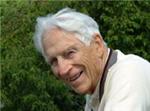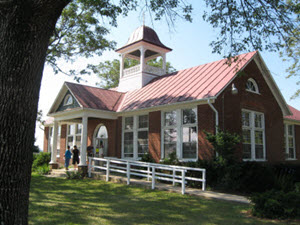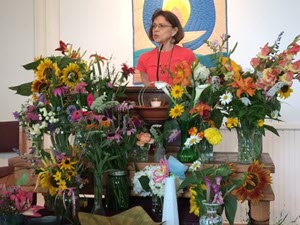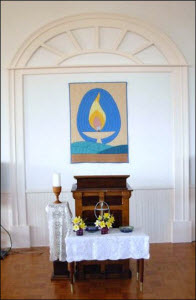
HUU Sermon Archives
The Day I Went to the Mountain
By James J. Geary
September 25, 2005
 I've
been to the mountain!
I've
been to the mountain!
When Martin Luther King said he’d been to the mountaintop, in his famous talk in Memphis the day before he was assassinated, I assume he was speaking figuratively.
I went to the mountain literally, physically. I wanted to spend a day on a mountain in contemplation. I knew that thinking, deep thinking with no holds barred, is difficult. So I took a simple lunch, coffee, and water, and spent the day on the Skyline Drive, trying to think deeply.
I left while it was still dark. On the way I stopped to look at the stars, and to try once again to get some inkling of the vastness of space. By the time I got to an overlook on the Drive, the smoky rose of the dawn had spread across the horizon, and it was definitely getting daylight. Morning fog, hugging the valleys and the hollows, etched the foothills below in sharp relief. It was a beautiful scene and it promised to be a magnificent September day.
Unfortunately, I didn’t feel tops. Maybe it was the sudden change of altitude. I almost came home at 9 o’clock, but I stuck it out till 4 p.m. — not always thinking deeply.
I went to the mountain because I wanted to try to realize finally, totally, who I am. I wanted to try to get a handle on what my life has been about and what I can expect down the road. I especially wanted to try to realize that I am 91 years old, that I am a very old man.
Because, frankly, I have a hard time doing that. I have looked in the mirror
at times, and said out loud: ”You are 91 years old.” But I didn’t really get it.
Because I don’t feel like what I believe a 91-year-old man should feel like.
Still, I know what the actuarial tables say, and they say I am coming to the end
of the road. So I wanted to confront the idea of death and get an insight into what
it means; to try to realize that death is something that is really going to happen
to me — and maybe not too far in the future.
I also wanted to think about some larger matters: the history of our species, the endless struggle, the poverty, the wars, the migrations. Closer home, I wanted to think about the triumphs and defeats in our individual lives, the joys and the agonies of love and marriage, the delights and the frustrations and pain of raising children. I wanted to come to some conclusion as to whether the long struggle we call life is worth it.
And I also wanted to think about some of the fundamental questions of life, and
existence, and the universe. I wanted to see if I have any reason to alter the way
I have viewed these questions for all of my adult life.
So it was a very ambitious quest that I undertook, too ambitious by far. And of
course I failed. If in a long life of thinking abstractly one can’t find answers
to these questions, it is not likely he is going to find the answers in a single
day, as the Buddha did in a single night sitting under the Bodi tree.
Still it wasn’t a total failure, else there would be no reason for me to be here today.
I didn’t fail because I didn’t prepare. I reread the 11 talks I have made to this fellowship over the past 16 years.. I reviewed my notes on the philosophy of religion, and on some of the many other courses in philosophy and Eastern religions that I took at JMU in the 70s and 80s.Those courses led to a second Bachelor’s degree in 1985 when I was 71 years old. So I did a lot of advance studying, thinking, and writing for my day on the mountain.
On the mountain I spent some time looking down into our valley. I thought about the busy every day world below. I spent some time looking off to the horizon, thinking about space, our solar system, about evolution and the human race, and especially about death.
I find that confronting the idea of death is the hardest of these, because it is so personal. I had brought a mirror with me, one of those shaving mirrors one side of which magnifies. Twice I stared straight into that mirror for a long time, trying to realize that the person I was looking at was going to die some day.
I think I had a little success — aside from discovering that the outside of my irises are blue and not brown. I think I realized — sort of — that in the not too distant future, the life in me will go out; and like a spent shell, and there will be nothing, just an empty casing — and somehow the world will go on without me.
I tried to think of nothingness. Because nothingness is the way I feel about death; that each living organism is a unique pattern, and with death the pattern disappears and there is nothingness. One dictionary definition of nothingness is non-existence. Another is death. But I find it impossible to grasp the idea of nothingness.
So I reined in my thinking to something I could understand. I tried to think of myself growing ever more fragile, more vulnerable, more helpless, an increasing burden to my wife Pat. That is not so hard to do. But it is very painful.
And I am sure that my longevity and relative good health and reasonably sound
mind at this time, are going to make it all the more painful as deterioration irresistibly
progresses. So I tried to come face to face with this likely scenario. I realize
that some failings of physical strength, and of resolve, and of course of memory,
have already taken place. Other people, especially my wife, may be even more aware
of these growing frailties. Of course, I could go quickly, from a massive heart
attack or stroke, and spare both Pat and me that long agony.
I said I wanted to think about life. So what about life? Thinking of my own life,
I boiled it down into a single paragraph:
I was begat. An egg and a spermatozoa joined, and I took form. As with each of you,
a new, unique pattern of life was created. It was life, the only permanent thing
in this world aside from energy, that gave me life. But, as I have said, in my view
there is no life after death, just emptiness, the pattern is no more. So what is
left? Influences, of course, the continuing effects of the countless actions of
my long life. But that is not life. Whatever life I shall leave behind is in my
progeny, my children and grandchildren, ad infinitum. I have been a bridge that
connected the life of my ancestors with the life of my descendants. The endless
thread of life goes on.
Have you ever tried to imagine yourself as a baby? I never had until some time ago.
I was lying in a tub of warm water and I suddenly thought of myself as a newborn
baby, lying on its back, kicking its legs and waving its arms as babies do. I could
see it all. I also tried to think of myself in the womb; or as a zygote. That is
harder.
One night when I was a newborn, my mother suddenly had this panicky feeling:
“Maybe the baby is dead,” she thought to herself. She rose and rushed to the crib
and put her hand on me and was relieved. Because she felt the warmth, the vital
warmth of life. It was the warmth engendered by the powerful survival qualities
of new life — new life, the greatest of all mysteries.
And now, here I am, 91 years later, still giving off the heat of life, the vastly
complex mechanism of life still functioning. I’m sure I don’t give off the same
feeling of warmth that baby gave off so long ago.
Did I have any new insights while up there? I can’t honestly say that I did. But
some of my established views were brought into better focus, just as my experiences
in this fellowship have sharpened those views. I thought again about ideas that
I have given expression to over the years.
I tried to think about the universe, once again. I don’t use words like god or
almighty, that signify an anthropomorphic being or intelligence, a first mover separate
from and outside of our universe. I prefer the word force, or the phrase ultimate
force. To me, that means the basic laws of the universe are the laws of energy,
and energy constitutes the universe, is the universe..
Whether this energy is finite or infinite, I feel is beyond the capacity of the
human mind to know. My own sense is that this force, for want of a better word,
is infinite. But the human mind can’t grasp the idea of infinity, nor, for that
matter, there not being infinity. That’s why the Buddha counseled against all such
inquiry, that it‘s futile, and that one should strive, rather, for right behavior.
He, and Jesus, and other religious teachers have given us rules for right behavior.
The great source of energy in our solar system is the our sun. Scientists say the
sun consumes 400 million tons of matter every second, releasing vast amounts of
energy. Where does that energy go?
In thinking about the sun and its dominance in our lives, I long ago dreamed up a little fantasy theory, a sort of fable. It goes like this:
The sun’s rays, streaming away from that great atomic furnace, want to change into something more complex. Most of that energy, maybe 99.9 per cent or more, goes off into space and is wasted. In the earth, however, it finds a ready recipient. At earth it churns up the atmosphere, drawing moisture from the oceans and thereby creating the highly complex weather patterns, the winds, the storms, the hurricanes, and tornadoes, the tsunamis.
But the crowning achievement is that it creates and sustains life. And what in all the universe could be more complex than life. At the apex of this complexity stands, it seems to me, the human brain, the most complex thing we know of.
And what does this life that the sun creates do? It organizes. It organizes into multicell life forms, and it organizes its environment for survival and for survival of the species. I can’t think of anything in this world other than life that does organize. Thus we call individual lives organisms.
So, is life good, is it positive, is there more pleasure than pain? I question that, you know. But if there is not more pleasure that pain, why do we hang on to life so fiercely? I think Darwin gave the answer to that in his theory of natural selection. I think we cling to life desperately because of evolution. It was those beings, from the very earliest forms of life, that recognized danger and that did their best to ward off danger, that survived.
And so their progeny inherited and built upon the same desire. Thus we fight
furiously to survive, we and every other form of life. We grasp with every tooth
and claw to hold on, we use all our cleverness, our guile, our fortitude, to keep
from dying, to gain advantage, to populate the world with our genes.
I have over my desk a beautiful 10 x 12 black and white photograph by Ansel Adams.
It’s of the snow-capped Grand Tetons. In the foreground is the Snake river, living
up to its name, snaking in a great reverse-S curve past those magnificent mountains.
I love that picture.
It is beautiful, but in that photograph is a basic question of being. Why are those mountains wasting away, their substance washed down and carried away by that river at their feet? Why are mountains only temporary? And if only temporary, why are they there in the first place? Why are we here? In thinking of these fundamental questions, does the concept why, make any sense. Does it have any meaning outside of concerns we have regarding other living beings. I think not. I believe everything is just flowing, and there is no why.
On the mountain I could see many mountains. I was conscious they were wasting
away. Heraclitus , one of the earliest pre-Socratic philosophers, said everything
is in flux, constantly moving. His famous illustration is that you can’t step into
the same river twice. The Buddhists also take this view.
Finally, on the mountain, I reviewed my two most basic beliefs about living beings,
to see if I could find some little crack of doubt in either of them.. First is my
belief in determinism, that we, and everything, exist in a materialistic world of
chemistry and physics. I believe we have no choice in how things develop from moment
to moment; that we have no free will. I could find no crack in that belief, not
withstanding the Heisenberg uncertainty principle.
My second fundamental belief is that there is an emotional balance in our lives,
that pain and pleasure are equalized, one dependent on the other. Here I found what
might be something of a tiny crack. I still believe it. But it may be, that on the
last day of life for a person racked in pain, that the final balance is realized
only after the person has lost consciousness but before death. But that is something
there is no way of measuring, no way of proving.
So, was my day on the mountain successful? Not to the extent I had hoped, but
enough for me to be glad I went. I may try again someday.
This could be my last talk to this group. They say never say never. But in reading
over the eleven talks I have made to this fellowship in the past 16 years, I find
I have said most of what I have to say.
And I discovered something else: much of it has been about me, my life, my philosophy, what I have learned. That must get boring after a while. And here I am, in what may be my final discourse, again discussing my own views, my own feelings. Well, I guess that‘s the subject I know the most about.
Read more sermons or talks by Jim Geary.
For the latest sermons and events at HUU, visit our Community Cafe.
Inclement
Weather Policy
Worship
Service Materials


UUs on YouTube
Our denomination has an official presence on YouTube! The Unitarian Universalist Association's YouTube site includes several videos and lots of interesting commentary.
Harrisonburg Unitarian Universalists 4101 Rawley Pike | Harrisonburg,
VA 22801
Mailing Address: | PO Box 96 | Harrisonburg, VA 22803
| (540) 867-0073 | Webmaster
HUU is a member of the Southern
Region of the Unitarian Universalist
Association
Privacy Policy &
Disclaimer
Site Design & Maintainence : Expression
Web Tutorials & Templates


